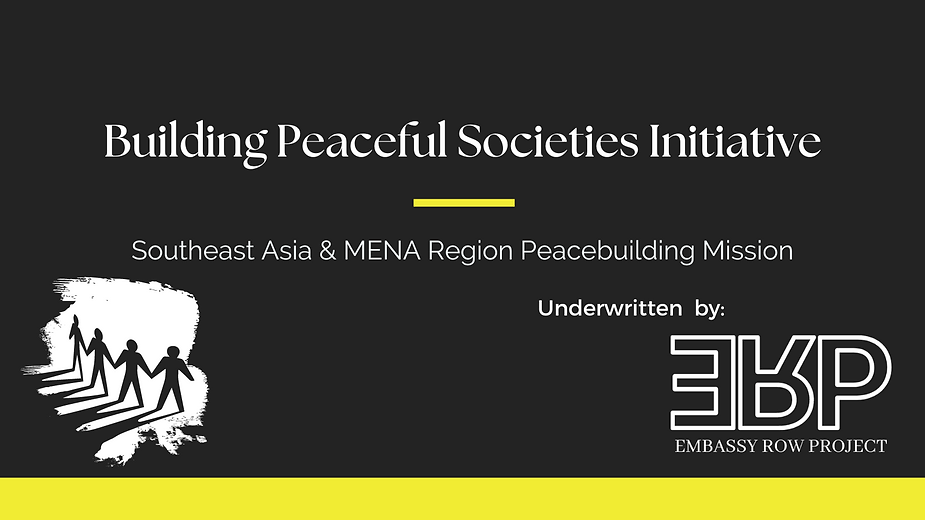The Embassy Row Project (ERP) has launched its most ambitious and comprehensive program to date: the “Building Peaceful Societies Initiative”. This groundbreaking peace-building training program is specifically designed to address the complex challenges faced by communities in conflict zones throughout Southeast Asia and the MENA region. By collaborating with regional leaders, select Embassy Row Project-supported NGOs, and intergovernmental organizations, ERP aims to develop and implement innovative strategies in Radicalization Prevention, Rehabilitation of Child Soldiers, and Countering Terrorist Recruitment.
Our initiative will encompass an extensive range of training collaborations, each targeting a specific aspect of peacebuilding and conflict resolution. These collaborations include:
- Understanding the Dynamics of Radicalization and Peacebuilding in Mindanao, Philippines: This program will focus on identifying the key factors driving radicalization in the region and developing strategies to promote peace and stability.
- Mapping Fragilities and Complexities in Countering Terrorist Recruitment in Boko Haram and Al Shabaab: This component aims to better understand the nuances of terrorist recruitment and develop targeted interventions to counteract their influence.
- Designing and Conducting Effective Research for Countering Radicalization and Rehabilitating Child Soldiers: This collaboration will provide guidance on designing and conducting research to better inform peacebuilding and rehabilitation efforts.
- Using Data to Inform Impactful Change Management Strategies in Preventing Radicalization and Rehabilitating Child Soldiers: By leveraging data and analytics, this program will help organizations optimize their interventions to maximize their impact.
- Developing Capacities for Sustainable Prevention of Radicalization and Rehabilitation of Child Soldiers: This initiative will focus on building the capacity of local organizations and communities to implement sustainable prevention and rehabilitation efforts.
- Integrating Identity Politics, Inclusion, and Restorative Justice in Radicalization Prevention and Rehabilitation of Child Soldiers: This collaboration will explore ways to promote inclusivity and restorative justice as key components of prevention and rehabilitation strategies.
- Building Global Citizenship Programs for Sustainable Countering of Terrorist Recruitment and Rehabilitation of Child Soldiers: This program will develop and promote global citizenship as a means to counter terrorism and foster rehabilitation.
- Providing Education for Sustainability in Emergencies: Armed Conflict, Disaster, and Health Crises for Children at Risk of Radicalization: This initiative aims to address the educational needs of children affected by conflict, natural disasters, and health crises, reducing their vulnerability to radicalization.
- Gender and Peacebuilding: Understanding Women’s Role in Countering Radicalization and Rehabilitating Child Soldiers: This program will examine the unique role women play in peacebuilding and explore ways to empower them in conflict resolution efforts.
- The Role of Formal Education in Cultivating Cultures of Peace and Nonviolence in Conflict-Ridden Regions: This collaboration will investigate the role of formal education in fostering a culture of peace and nonviolence in areas affected by conflict.
- Education for Peace: Key Topics and Concepts for Cultivating a Culture of Peace and Countering Radicalization: This program will delve into the essential topics and concepts necessary for cultivating a culture of peace and countering radicalization.
- Education by Peace: Fostering the Pedagogy of Peace in Teaching and Learning to Prevent Radicalization and Rehabilitate Child Soldiers: This initiative will focus on integrating peace-based pedagogy into education systems as a means to prevent radicalization and rehabilitate child soldiers.
- Rethinking Traditional Education Structures and Systems to Support Radicalization Prevention and Rehabilitation of Child Soldiers: This program will explore new and innovative ways to adapt education systems to better support prevention and rehabilitation efforts.
- Creating and Sustaining Peace-Based Learning Schools: Design, Curriculum, and Funding Strategies for At-Risk Children: This initiative will provide guidance on creating and sustaining peace-based learning schools to cater to the needs of at-risk children, covering design, curriculum development, and funding strategies to ensure their long-term success.
- Developing Effective Conflict Resolution and Peer Mediation Programs for Diverse Communities in Conflict-Ridden Regions: This collaboration aims to establish conflict resolution and peer mediation programs that cater to the unique needs of diverse communities, helping them navigate and resolve conflicts in a constructive manner.
The “Building Peaceful Societies Initiative” is built on the belief that by focusing on these key areas, we can foster sustainable peace and empower communities to resist the spread of radicalization and violence. Through extensive research, collaboration, and the sharing of best practices, our initiative seeks to create a lasting impact on the lives of those affected by conflict.
As we embark on this important mission, we are dedicated to forging strong partnerships with local and international stakeholders who share our vision of a more peaceful and just world. By working together, we can transform the lives of countless individuals, families, and communities, and build a brighter future for generations to come.





